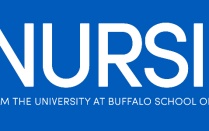Building Our Global Initiatives
Nursing students travel to Peru and Belize to provide care to families in need.

Moira Carman, UB nursing student examining pediatric patient in Belize.
Published September 1, 2014 This content is archived.
While many college students look forward to the winter break as a time to spend skiing or swimming with friends and family, UB nursing students travelled to Central and South America to provide health care to families in need. And the undergraduates got college credit for it.
During the first UB This Winter 2014 — nursing students enrolled in study abroad courses to immerse themselves in cultural/clinical experiences beyond the classroom. Marsha Lewis, dean of the School of Nursing, says the new winter session provided an opportunity for nursing students that hadn’t been available before. “In order to meet the strict
criteria for state certification and licensure upon graduation, nursing students had little time during a semester to participate in clinical field experiences outside of the curriculum. With this new session our students are able to participate in wonderful service learning experiences that offer them exposure to clinical practice in different cultures,” stated Dr. Lewis.
In January, two nursing faculty members took two groups of students to Belize and Peru. Dr. Joann Sands, clinical assistant professor who specializes in disaster and emergency preparedness, accompanied 7 students to Belize. Dr. Dianne Loomis, clinical associate professor who specializes in primary care and refugee care, accompanied 5 students to Peru. Dr. Sands says UB Nursing worked with the university’s Study Abroad program, as well as International Service Learning (ISL) to arrange visits to villages and health clinics in Belize for 9 days. Dr. Sands stated, “We held health clinics in San Lazaro and San Jose. At the end of the week, we presented a health education fair day in the village of Carmelita. The students also had an opportunity to shadow some of the nurses at the hospital in Orange Walk.”
Dr. Loomis collaborated with SUNY Brockport’s Study Abroad program to send 18 UB and Brockport students to Peru. Her group worked with Sacred Valley Health to promote health in the underserved rural communities of Peru’s Sacred Valley. “We went to Ollantaytambo in the Sacred Valley Region for our health care initiatives,” says Dr. Loomis. “Sacred Valley Health set our goals, which were to assist the community health workers in teaching community members about best health practices and first aid. Participants also received physical exams and fluoride treatments.” Drs. Sands and Loomis say that while they knew the conditions for nursing practice would be different from what the students encountered in the U.S., there were surprises. “For instance,” says Dr. Sands, “In Belize, the hospital had no pharmacy so nurses there are responsible for mixing medications and IV fluids themselves. There is no sterile processing department so the nurses prepare their own sterile equipment. In the U.S., we take for granted our access to vitamins but they are extremely expensive in Belize.”

UB FNP Student Christine Wandzilak teaching CPR to mother in Peru.
Dr. Loomis adds that in Peru, “the lack of such resources as ophthalmology and dental care” posed barriers to optimal health. “Also, the limited hand-washing opportunities with clean water presented a challenge.” Members of the UB contingent relied on their strong clinical and physical assessment skills because access to diagnostic testing, such as EKG machines, CT scanners, blood tests and X-rays, was limited. “All of the diagnoses were made solely on interviews and physical assessments,” says Dr. Sands. “We use technology every day in the U.S., from the electronic medical record to reference material so it was difficult to proceed with little to no technology.” Belize was chosen in part because it is primarily English speaking but in Peru, Spanish and Quechua were the languages spoken. The Peru group relied on interpreters — employees of Sacred Valley Health and other students proficient in the languages. All students participated in Spanish classes. “Immersion into the culture and language assists students to better understand the experience of limited language proficiency, which occurs in Buffalo when caring for our refugee and Spanish-speaking populations,” says Dr. Loomis.
Dr. Sands says the living conditions were shocking, with most families living in very small homes or shacks with concrete or dirt floors, occupied by 6 to 12 people. Both instructors were moved by the individuals in both countries who were generally in good spirits. “Everyone we saw in Belize was so happy and patient,” says Dr. Sands. “Many people would wait hours in hopes of seeing a doctor. They would wait for health care for four to five hours, and if we couldn’t get to them, they would say ‘It’s OK, we will try again tomorrow,’ and not be upset!” Dr. Sands’ group of 7 students saw 85 patients during its stay; Loomis’ group of 18 — 5 from UB, 13 from Brockport — saw approximately 150 to 200 patients. Dr. Loomis says the most rewarding part of the trip for her was listening to the students during end-of-day debriefing sessions discuss what they had learned and how they had been affected by their experiences, both professionally and personally.
Dr. Sands says this kind of trip is invaluable because the students are immersed in the cultural reality of the patients they are caring for. She called it “cultural humility” — engaging and interacting with people, rather than reading descriptions about them in a book. “The nursing school will continue to offer these opportunities to students. I am so proud of our faculty and students as they provide health care to those in need here, as well as beyond our borders,” Dr. Lewis stated.
- SARA R. SALDI
Read More UBNursing
Current Issue
Past Issues
We want to hear from our incredible alumni. Whether you live in Western New York or anywhere else in the world, stay in touch! Send us a class note.

